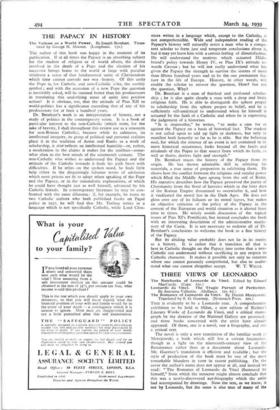THE PAPACY IN HISTORY
The Vatican as a World Power. By Joseph Bernhart. Trans- lated by George N. Shuster. (Longmans. US.) THE author of this book was happy in the moment of its publication. If at all times the Papacy is an absorbing subject for the student of religion or of world affairs, the drama involved in the death of a Pope and the election of his successor brings home to the world at large with peculiar vividness a sense of that fundamental unity of Christendom which time cannot corrode nor war riestroy. Of this unity the Pope is, for Catholic and non-Catholic a:ike, the earthly symbol ; and with the accession of a new Pope the question is inevitably asked, will he succeed better than his predecessors in translating this underlying sense of unity into positive action? It is obvious, too, that the attitude of Pius XII to world-politics has a significance exceeding that of any of his predecessors for at least a hundred years.
Dr. Bernhart's work is an interpretation of history, not a study of politics in the contemporary sense. It is a book of particular interest to the non-Catholic (which term, for the sake of brevity, I shall throughout this review use as a synonym for non-Roman Catholic), because ..while its calmness, its intellectual integrity, its grasp of political and personal realities place it in the tradition of Acton and Ranke as a work of scholarship, it alscrreflects an intellectual humility—or, rather, a moderation in the claims it makes for the intellect—some- what alien to the best minds of the nineteenth century. The non-Catholic who wishes to understand the Papacy and the attitude of the Catholic towards it finds his path beset with difficulties. If he relies on the spoken word, he finds little help either in the disgustingly fulsome terms of adulation which most priests see fit to adopt when speaking of the Pope and the Papacy, or in the rationalistic explanations, of which he could have thought just as well himself, advanced by his Catholic friends. In contemporary literature he may be con- fronted with the same dilemma : if, for example, he turns to two Catholic authors who both published books on Papal policy in 1937, he will find that Mr. Teeling writes in a language which is not specifically Catholic, while Lord Clon- more writes in a language which, except to the Catholic, is not comprehensible. Wide and independent reading of the Papacy's history will naturally assist a man who is a compe- tent scholar to form just and temperate conclusions about it, but it may yet leave him with a certain feeling of dissatisfaction. He will understand the motives which actuated Hilde- brand's policy towards Henry IV, or Pius IX's attitude to- Wards Cavour ; but he will not really understand what has given the Papacy the strength to survive the storms of more than fifteen hundred years and to be the one permanent fea- ture in the life of Europe. History, in other words, will enable the scholar to answer the question, How? but not the question, Why?
Dr. Bernhart is a man of finished and profound scholar- ship ; he is also quite clearly a man with a deep and lively religious faith. He is able to distinguish the sphere proper to scholarship from the sphere proper to belief, and he is sufficiently self-analytical to understand when he himself is actuated by the faith of a Catholic and when he is expressing the judgement of a historian.
"It is impossibie," he writes, "to make a case for or against the Papacy on a basis of historical fact. The student is not called upon to add up light or darkness, but only to manifest both i honestly so far as he is able. But the believing soul, for which the essence of an event is not contained in its mere historical occurrence, looks beyond all the faults and misdeeds of the Popes to that source from which its faith, as well as theirs, derives light and strength."
Dr. Bernhart traces the history of the Papacy from its origin. He has shown admirable skill in selecting his materials, a true sense of proportion in exhibiting them. He shows how the conflict between the religious and secular power which filled the Middle Ages sprang from the soil of Rome. His narrative describes how the Papacy preserved the purity of Christianity from the flood of heresies which in the later days of the Roman Empire threatened to overwhelm it, and how it vindicated the moral law in the Dark Ages. He does not gloss over any of its failures or its moral lapses, but makes an objective criticism of the policy of the Papacy in the context of the European and world situation as it altered from time to times. He wisely avoids discussion of the topical issues of Pius XI's Pontificate, but instead concludes the book with an interesting description of the administrative machi- nery of the Curia. It is not necessary to endorse all of Dr. Bernhart's conclusions to welcome the book as a fine history of the Papacy.
But its abiding value probably does not lie in its merits as a history. It is rather that it translates all that is best in Catholic thought on the Papacy into terms that a non- Catholic can understand without sacrificing in any respect its Catholic character. It makes it possible not only to venerate where one cannot presently comprehend, but also to under-
stand what one cannot altogether accept. W. T. WELLS.














































 Previous page
Previous page